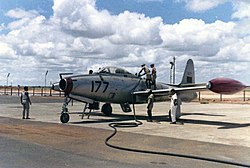Angolan War of Independence
The Angolan War of Independence was from 1961 to 1975. Angola fought against Portugal. Portugal was making people in Angola farm cotton. Three different groups in Angola were against Portugal. Agostinho Neto was the leader of the war. Portugal was winning the war when the country's government became democratic. An agreement was signed to let Angola become independent.
About three thousand people died because of the war.[3]
Angolan War Of Independence Media
A Portuguese F-84 being loaded with ordnance in the 1960s, at Luanda Air Base, during the Portuguese Colonial War.
- Sujet: Jonas Savimbi* * Source: Eege Foto (1989) vum user ernmuhl * Lizenz; GDFL
References
- ↑ Crocker, Chester A.; Fen Osler Hampson, and Pamela R. Aall (2005). Grasping The Nettle: Analyzing Cases of Intractable Conflict. p. 213.
- ↑ Portugal Angola
- ↑ The Decolonization of Portuguese Africa: Metropolitan Revolution and the Dissolution of Empire by Norrie MacQueen - Mozambique since Independence: Confronting Leviathan by Margaret Hall, Tom Young - Author of Review: Stuart A. Notholt African Affairs, Vol. 97, No. 387 (Apr., 1998), pp. 276-278, JSTOR







